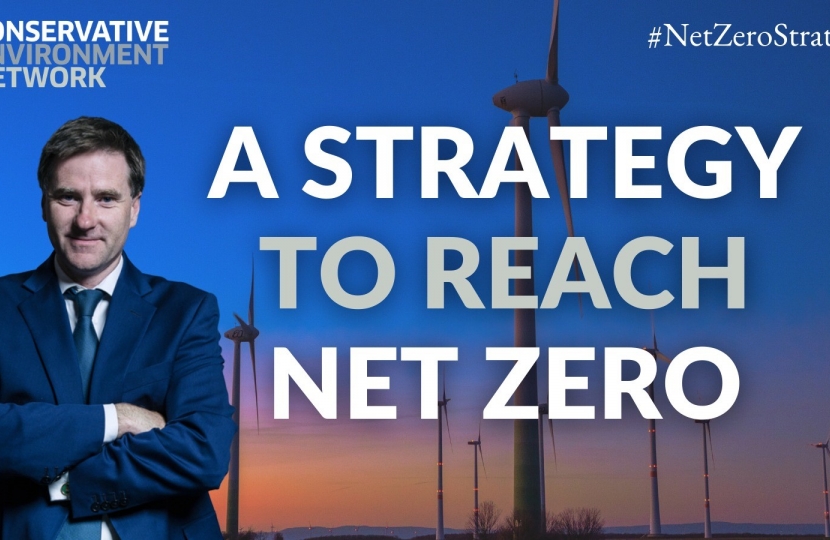
Local MP, Steve Brine, has welcomed the publication of the Government's Net Zero Strategy, which sets out our vision for how we will transform our economy and society to be cleaner, greener, and more innovative as we strive to achieve net zero by 2050.
Visit Steve's Green Winchester pages
He says; "We have achieved a lot already, decarbonising faster than any other G7 country with a 44% reduction in emissions between 1990-2019, while growing the economy by 78%. But we know we must go further and act now on climate change.
"In doing so we must embrace the opportunities of the new Green Industrial Revolution, getting a head start which will generate jobs and attract investment across the UK to level up Britain and build back better.
"The Net Zero Strategy builds on the Prime Minister’s Ten Point Plan, and other key publications and sets out a clear path for the changes we need to secure our energy, create jobs and new industries, and end our contribution to climate change.
"Of course I realise our political opponents will say it's not enough and attempt to feed public cynicism but we'd expect nothing else. What we have here is a serious and credible strategy which has been welcomed by the independent IPCC as being in line with what they asked of Government. It is the job now of MPs to hold Ministers feet to the fire and ensure it is all delivered. I look forward to playing my part in that as an experienced member of the House of Commons."
The new plan will be guided by the following principles:
- We will work with the grain of consumer choice: no one will be required to rip out their existing boiler or scrap their current car.
- We will ensure the biggest polluters pay the most for the transition through fair carbon pricing once current gas price spikes subside.
- We will ensure that the most vulnerable are protected through Government support in the form of energy bill discounts, energy efficiency upgrades, and more.
- We will work with businesses to continue delivering deep cost reductions in low carbon tech through support for the latest state of the art kit to bring down costs for consumers and deliver benefits for businesses.
Steve adds; "We recognise that this is not just an environmental transition but an economic one. So the Strategy sets a clear direction for businesses, giving them the certainty they need to invest, grow, and make UK home to new ambitious projects."
The strategy will:
- Level up our country supporting 190,000 green jobs in the mid-2020s and around 440,000 jobs across net zero sectors in 2030.
- Build a secure, home-grown energy sector which ends our dependency on volatile foreign gas prices, which will help protect consumers and businesses.
- Leverage up to £90 billion of private investment by 2030 levelling-up our former industrial heartlands. This will build on the investment secured through the Prime Minister’s Ten Point Plan for example Siemens Gamesa investing £186 million to expand offshore wind blade manufacturing in Hull; Nissan and Envision will invest £1 billion to create an electric vehicle manufacturing hub and Gigafactory in the North East.
- Take a credible approach to cutting our climate emissions, keeping us on track to meet our carbon reduction targets, including our Nationally Determined Contribution (68% reduction by 2030) and Carbon Budget 6 (78% by 2035).
Steve continues; "Our Strategy gives businesses and industries the certainty they need to invest, grow, and put the UK at the forefront of innovation that will help tackle climate change. It shows how government is working with them to bring down the costs of key technologies to give the UK a competitive edge. It explains how we will use public finance to leverage the private investment we need to pull through technologies and infrastructure from innovation to market.
"Buildings are responsible for around 30% of our national emissions but more importantly decarbonising our homes provides with an unparalleled opportunity for job creation and innovation. That is why our Heat and Buildings Strategy, also published today, will signal a step change in improving the energy efficiency of our buildings and how we heat them, supporting 240,000 green skilled jobs by 2035 and delivering £6 billion additional GVA by 2030.
"From 2035, all new heating systems installed in UK homes will either use low-carbon technologies, such as electric heat pumps, or will support new technologies like hydrogen-ready boilers, where we are confident we can supply clean, green fuel.
"Under plans, no-one will be forced to remove their existing fossil fuel boilers, but with industry confident that electric heat pumps will be as cheap to buy and run as gas-fired appliances by 2030, homeowners will be able to easily make these choices when the time comes to replace their old boiler.
"To encourage consumers to install low-carbon alternatives in the meantime, a new £450 million three-year Boiler Upgrade Scheme will see households offered grants of £5,000 for low-carbon heating systems. The scheme will open in April 2022.
To ensure electric heat pumps will be no more expensive to run than gas boilers, ministers want to reduce the price of electricity by shifting levies away from electricity bills over the next decade. A call for evidence is expected to be published with decisions made in Spring 2022. Implementation would happen over many years."
Alongside the Net Zero Strategy and Heat and Buildings Strategy, today the Government are publishing: a response to the Climate Change Committee’s Progress in Reducing Emissions annual progress report, meeting our statutory duty under the Climate Change Act; and the Net Zero Review, an analytical report that explores the key issues as the UK decarbonises.
More information ...
Read the Net Zero Strategy - Build Back Greener in full
See 'at a glance' by sector some of the headlines from the NZ strategy
You can find copies of the Phasing Out Fossil Fuel Heating Systems in Businesses and Public Buildings off the Gas Grid consultation, Phasing Out Fossil Fuel Heating in Homes off the Gas Grid consultation, Market Mechanism for Low-Carbon Heat consultation, and the Government response to the ‘Future Support for Low Carbon Heat’ consultation: Boiler Upgrade Scheme (BUS)' here via Gov.UK


